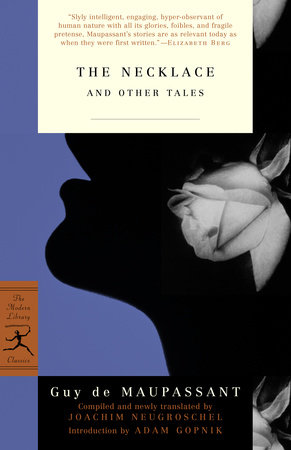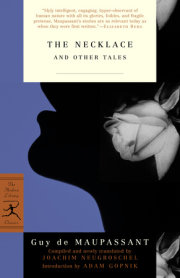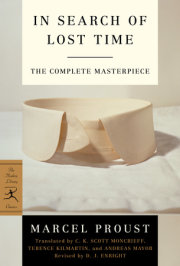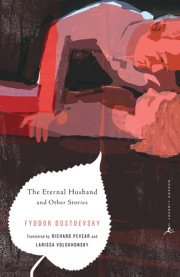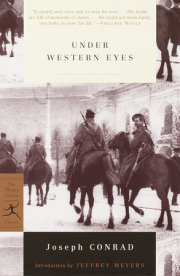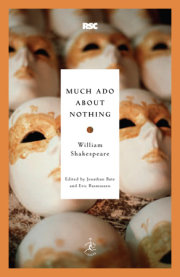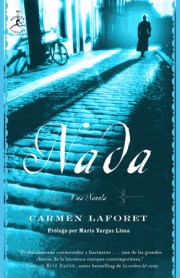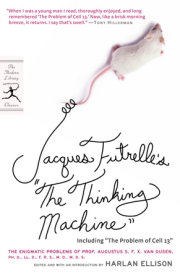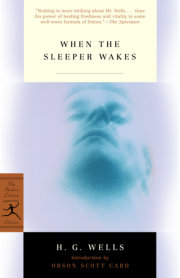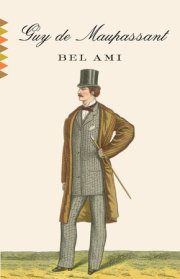The Necklace
She was one of those pretty and charming girls who, as if through some blunder of fate, are born into a family of pen pushers. She had no dowry, no prospects, no possibility of becoming known, appreciated, loved, of finding a wealthy and distinguished husband. And so she settled for a petty clerk in the Ministry of Education.
Unable to adorn herself, she remained simple, but as miserable as if she’d come down in the world. For women have no caste or breed; their beauty, their grace, and their charm serve them in lieu of birth and family background. Their native finesse, their instinct for elegance, their versatile minds are their sole hierarchy, making shopgirls the equals of the grandest ladies.
She suffered endlessly, feeling that she was meant for all delicacies and all luxuries. She suffered from the poverty of her apartment, the dinginess of the walls, the shabbiness of the chairs, the ugliness of the fabrics. All these things, which wouldn’t have even been noticed by any other woman of her station, tortured her and infuriated her. The sight of the Breton girl who did her humble housework aroused woeful regrets in her and desperate dreams. She fantasized about hushed antechambers with Oriental hangings, illuminated by high, bronze torchères, and with a pair of tall footmen wearing knee breeches and napping in spacious easy chairs because of the air made heavy by the heater. She fantasized about large drawing rooms lined with ancient silk, about fine furniture carrying priceless knickknacks, about small, fragrant, dainty parlors meant for five o’clock chats with the most intimate friends, well-known and sought-after men whose attention was envied and desired by all women.
Whenever she sat down for supper at the circular table covered with the same tablecloth for three days, she faced her husband, who, removing the lid from the tureen, ecstatically declared: “Ah! A good stew! I don’t know of anything better!”
But she fantasized about elegant dinners, about shiny silverware, about tapestries filling the walls with ancient figures and exotic birds in the midst of a magic forest; she fantasized about exquisite courses served in wondrous vessels, about gallantries whispered and listened to with sphinxlike smiles, while the diners consumed the rosy flesh of a trout or the wings of a grouse.
She had no wardrobe, no jewels, nothing. And those things were all that she loved; she felt that they were what she’d been born for. She so dearly wanted to be liked, to be envied, to be seductive and in demand.
She had a rich friend, from convent-school days, whom she stopped visiting because she suffered so deeply upon coming home. And she’d weep for entire days, weep with chagrin, with regret, with despair, and with distress.
Now, one evening, her husband came home exuberantly, clutching a large envelope. “Look,” he said, “here’s something for you.”
She ripped it open and pulled out a printed card bearing these words:
The Minister of Education and Madame Georges Ramponneau ask Monsieur and Madame Loisel for the pleasure of their company at a soirée at the Ministry on Monday, 18th of January.
Instead of being thrilled, as her spouse had hoped, she resentfully hurled the invitation on the table, muttering: “What do you want me to do with this?”
“But darling, I thought you’d be pleased. You never go out, and this is an occasion, a wonderful occasion! I went to endless trouble to get our names on the list. Everyone wants an invitation. They’re greatly desired, and not too many clerks are invited. You’ll see the entire official world there.”
She glared at him, irritated, and snapped impatiently: “What do you expect me to wear?”
Her spouse hadn’t considered that; he stammered: “Why, the gown you wear to the theater. It strikes me as very nice. . . .”
He held his tongue, stupefied, bewildered, upon seeing his wife crying. Two big tears rolled slowly from the corners of her eyes toward the corners of her mouth. He stuttered: “What’s wrong? What’s wrong?”
But with a violent effort, she repressed her pain, and, wiping her moist cheeks, she answered in a calm voice: “Nothing’s wrong. Except that I’ve got nothing to wear and consequently I can’t go to that ball. Give your card to some colleague whose wife’s got a better wardrobe than I.”
He was desolated. He went on: “Look, Mathilde. How much would it cost—a suitable gown that you could use on other occasions, something very simple?”
She mulled for several instants, making estimates in her head, trying to hit on a figure that she could ask for without drawing an immediate refusal and terrified exclamation from the frugal clerk.
At last, she hesitantly responded: “I’m not sure about an exact sum, but I think I could manage with four hundred francs.”
He blanched slightly, for he had saved up that very amount to buy himself a rifle and go hunting that summer on the plain of Nanterre, with friends who’d be shooting larks on Sundays.
Nevertheless he said: “Fine. I’ll give you four hundred francs. But try to have a beautiful gown.”
The night of the ball was approaching, and Madame Loisel appeared sad, worried, anxious. Still, her gown was ready.
One evening, her husband said to her: “Listen, what’s wrong? You’ve been acting funny for three days now.”
And she replied: “I’m annoyed that I don’t have any jewelry—not a single gem, nothing to put on. I’ll look downright poverty-stricken. I’d almost rather not go to the ball.” He rejoined: “You’ll wear real flowers. They’re very chic this season. For ten francs you’ll have two or three magnificent roses.”
She wasn’t convinced. “No. . . . There’s nothing more humiliating than looking like a pauper in the middle of rich women.”
But her husband exclaimed: “How silly you are. Go to your friend Madame Forestier and ask her to lend you some jewelry. The two of you are close enough for you to do that.”
She uttered a cry of joy. “You’re right! It didn’t occur to me!”
The next day, she went to her friend and explained her distress. Madame Forestier went to a mirrored armoire, removed a large case, brought it over, opened it, and said to Madame Loisel: “Take your pick, my dear.”
Madame Loisel looked first at some bracelets, then at a pearl necklace, then at a marvelously crafted Venetian cross made up of gold and precious stones. She tried the pieces on before the mirror, wavering, unsure whether to keep them or leave them. She kept asking: “Don’t you have anything else?”
“Of course. Keep searching. I can’t tell what you’ll like.”
All at once, in a black satin box, Madame Loisel unearthed a superb diamond necklace, and her heart began pounding with unrestrained desire. Her hands trembled when she picked up the necklace. She placed it on her throat, against her high-necked dress, and remained ecstatic in front of her reflection. Then, hesitant and fearful, she asked: “Can you lend me this, nothing but this?”
“Of course, by all means.”
Madame Loisel flung her arms around her friend, hugged her passionately, then fled with her treasure.
The night of the ball arrived. Madame Loisel was a grand success. She was lovelier than any other woman, elegant, gracious, smiling, and wild with joy. All the men gazed at her, asked for her name, and tried to get introduced. All the cabinet attachés wanted to waltz with her. The minister noticed her.
She danced, intoxicated, swept away, heady with pleasure, thinking of nothing, in the triumph of her beauty, in the glory of her conquest, in something like a cloud of happiness made of all that homage, all that admiration, all that awoken yearning, all that complete victory that is so dear to a woman’s heart.
She left around four in the morning. Since midnight her husband had been dozing in a small, deserted salon with three other men whose wives were having a wonderful time.
Monsieur Loisel, bringing the wraps for their exit, tossed them over her shoulders: they were the modest garments of ordinary life, their poverty clashing with the elegance of the ball gown. She sensed the discord and wanted to flee, to avoid being noticed by the other women, who were bundling up in expensive furs.
Loisel held her back: “Just wait. You’ll catch cold out there. I’ll hail a cab.”
But she didn’t listen, she hurried down the stairs. Out in the street, they couldn’t find a cab; so they began searching, shouting at the drivers whom they saw riding by in the distance.
They walked down to the Seine, desperate, shivering. Finally, on a quay, they found one of those old, nocturnal broughams that you see in Paris only at night as if they were ashamed of their squalor by day. It brought them to their front door on Rue des Martyrs, and they sadly trudged up to their apartment. It was all over for her. And as for him, he knew he had to be at the Ministry by ten a.m.
Stripping off the wraps that had enveloped her shoulders, she stood in front of the mirror to view herself in her glory again. But suddenly she uttered a cry. The necklace was gone from her neck!
Her husband, already half undressed, asked her: “What’s the matter?”
She turned toward him, panic-stricken: “I . . . I . . . I don’t have Madame Forestier’s necklace.”
He rose in horror: “Huh? What do you mean?! That’s impossible! . . .”
And they searched the folds of her gown, the folds of her coat, the pockets—everywhere. They did not find the necklace.
He asked her: “Are you sure you had it when we left the ball?”
“Yes, I touched it in the vestibule of the Ministry.”
“Well, if you’d lost it in the street, we’d have heard it fall. It must be in the cab.”
“Yes. Probably. Did you jot down the number?”
“No. What about you? Did you get it?”
“No.”
Their eyes locked in terror. Finally Loisel put his clothes back on.
“I’m going to scour the entire distance that we walked—I’ll see if I can find it.”
And he left. Too feeble to go to bed, she remained in her gown, sprawling on a chair, her heart inert, her mind blank.
Her husband returned at around seven. He had found nothing.
He went to the police station, to the cab companies, to the newspapers, promising a reward—he went wherever a glimmer of hope beckoned.
She waited all day, still bewildered by that dreadful disaster.
Loisel came back in the evening, his face gaunt and pale; he had discovered nothing.
Copyright © 2003 by Guy de Maupassant. All rights reserved. No part of this excerpt may be reproduced or reprinted without permission in writing from the publisher.

